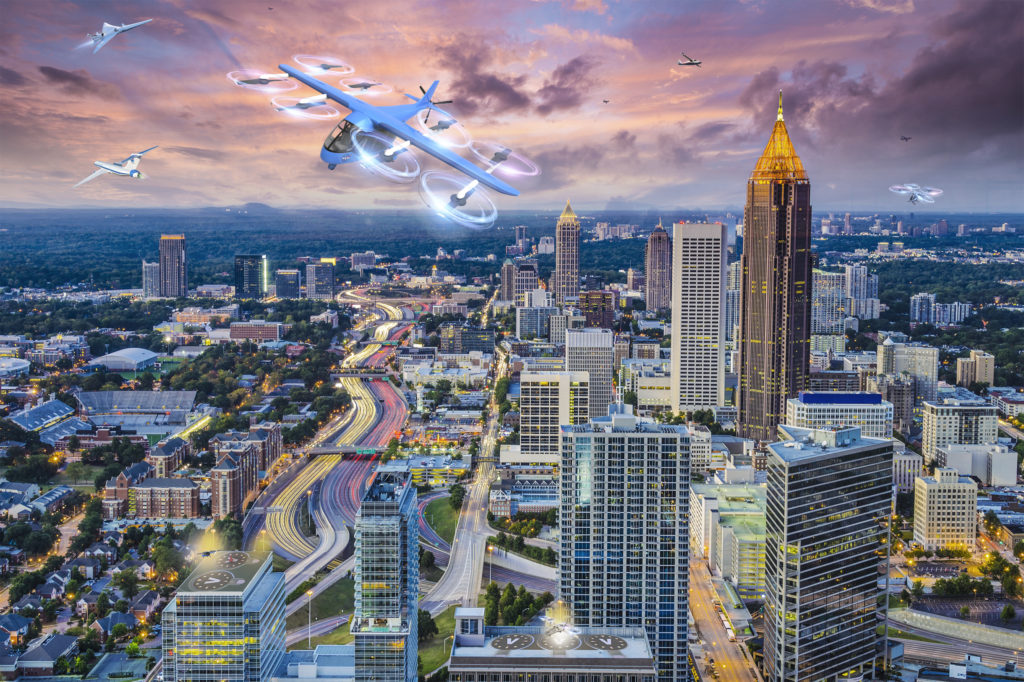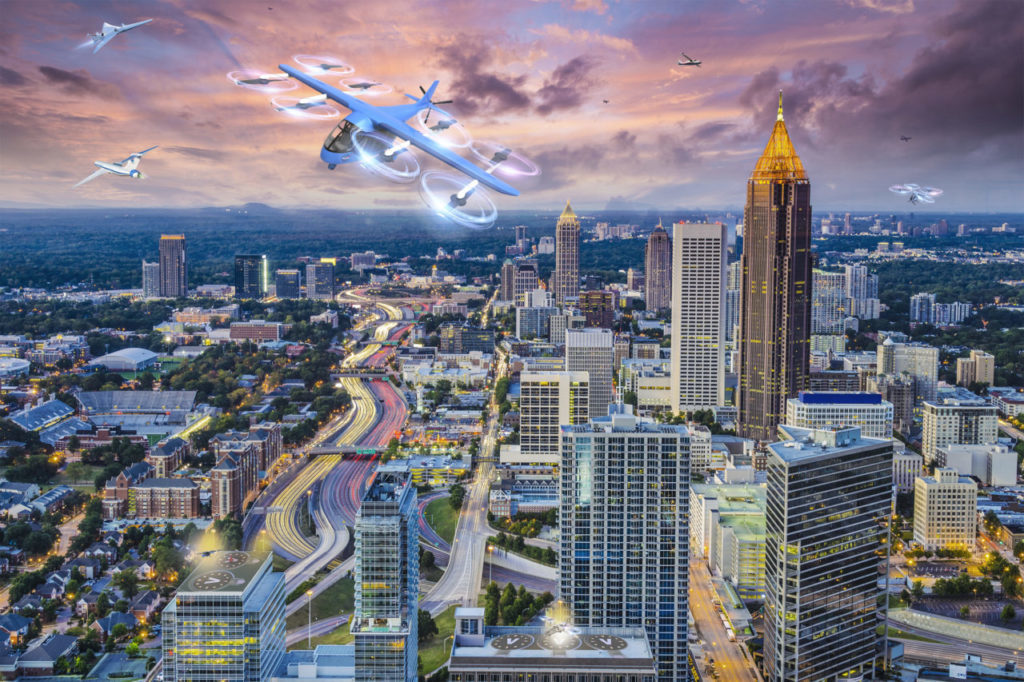Air Taxis Likely to Not Deploy in Early to Mid 2020s as Predicted, New Report Says


An illustration of downtown Atlanta, Georgia with air taxis in the skies. (NASA)
Electric vertical take-off and landing (eVTOL) aircraft are still facing many technological, regulatory, and infrastructure hurdles and will likely not deploy in the early-to-mid 2020s as some have predicted, new research from PitchBook says.
PitchBook’s Mobility Analyst, Asad Hussain, writes in the report that the eVTOL industry will have to overcome issues such as battery density, manufacturing competition from high-volume automakers, lack of infrastructure, certification hurdles, and a possible pilot shortage. However, the industry can be successful with the support of non-traditional investors funding research and development of these aircraft.
“While the flurry of SPAC-driven public market debuts in air mobility has created a peak of investor expectations, we believe mass eVTOL deployments in the early-to-mid 2020s are unlikely given large technological, regulatory, and infrastructure-related hurdles,” Hussain said. “Nonetheless, there are clear, long-term commercial use cases for passenger air mobility, and we are relatively positive on the long-term business prospects for well- capitalized leaders in the space such as Joby Aviation, Archer Aviation, and Volocopter; as well as enablement technologies from providers including Daedalean, Reliable Robotics, and PHM Technology.”
Hussain said the energy density of batteries will need to improve significantly for eVTOLs to be successful. Air taxi manufacturers will also have to contend with competition from automakers to secure the supply of these batteries.
A pilot shortage could also constrain growth in the eVTOL industry despite the focus by some on autonomous solutions, Hussain said. While in the long-term autonomous systems will help the industry by allowing non-certified pilots to fly aircraft, the technology is not advanced enough for this in the near future. Regulatory bodies have not yet come to a consensus about how to certify this new technology.
According to Hussain, the certification hurdles for eVTOL aircraft have also been underestimated. The report forecasts the cost for certification including design work and setting up production facilities to exceed $1 billion.
“Of the 100+ startups developing eVTOL technology, only Joby Aviation, Lilium, and Archer have raised enough to cross this threshold (as of March 2021),” Hussain said. “As this ecosystem develops, we believe dozens of smaller startups in the space will ultimately be forced to shutter their projects due to the high cost of certification.”
Air taxis will also require new infrastructure developments like vertiports, charging stations, and air traffic management systems representing another hurdle to adoption. While some companies have invested in this technology it has yet to be developed enough to warrant use in the early to mid-2020s.
“Despite these hurdles, we are optimistic about the industry over the long- term as eVTOL aircraft provide major advantages relative to helicopters, such as reduced noise levels,” Hussain said.
The report suggests the implementation of mandated model-based system engineering tools could be possible for future airworthiness rules. This could also provide safety benefits.
“Model-based systems engineering (MBSE) could provide a solution to these challenges by moving previously siloed workflows and data to centralized model-based platforms for systems engineering,” Hussain said. “MBSE solutions provided by companies such as Siemens and PHM Technology enable companies to accelerate product development for complex projects while reducing unexpected costs, as well as more cohesively integrate design, analysis, validation, and verification during the product development lifecycle. Startups that have made progress adopting these engineering systems may have an edge over competitors.”
According to the report, eVTOLs could reduce noise levels by 20dB compared to helicopters which could help in their adoption.
“Quieter aircraft should lead to increased routes opening closer to residential areas, significantly expanding the market for air mobility beyond existing helicopter routes,” Hussain said. “Additionally, eVTOL aircraft do not produce emissions, a factor that could speed adoption as governments seek ways to offset carbon emissions from conventional transportation solutions.”
Air taxis could also provide a cost advantage once scale is reached that could further speed adoption. According to the report, helicopters cost approximately $9 per mile where eVTOL manufacturers are estimating their costs to be between around $3 per mile.
“Uber Elevate, the urban air mobility division of Uber (which has since been acquired by Joby Aviation), focused on piloted air taxi flights to reach profitability, but forecast that 2030+ air mobility operations would decrease cost per passenger mile to that of existing ground ride-hailing operations (approximately $2.50 per mile),” Hussain said. “Air taxi startup Lilium has claimed that the cost of a trip from Manhattan to JFK Airport could be $70, or approximately $4.40 per mile. Joby Aviation estimates the operating cost of its aircraft will be $3.80 per mile for a 25-mile trip, significantly below the cost of a $9-per-mile helicopter trip.”
In 2025 the global air taxi passenger mobility market will grow to $1.5 billion in revenue, the report forecasts. By 2035 the industry’s predicted revenue will jump to $150.9 billion which is equivalent to about 19.4 percent of expected global airline revenue in 2021.
“Although the industry faces significant technological and regulatory hurdles, we believe nontraditional investors such as manufacturers and corporates with vested interests in shaping the evolution of the transportation industry will continue to fund R&D in the space, helping drive a new wave of innovation and reshaping the aviation industry,” Hussain said.
The post Air Taxis Likely to Not Deploy in Early to Mid 2020s as Predicted, New Report Says appeared first on Aviation Today.
Check FastApn access for commercial satcoms at Fastapn
Flytlink – Avionics, Satcom’s and IFE Consultants






